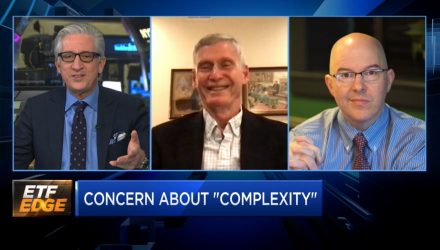Attorney Thomas Gorman from Dorsey Whitney, an expert on SEC enforcement, Dave Nadig, financial futurist at ETF Trends, and Kim Arthur, CEO at Main Management, discuss the Financial Industry Regulatory Authority’s (FINRA) recent warning regarding complex products and the risks they pose for retail investors who might be less educated on this week’s “ETF Edge,” hosted by Bob Pisani on CNBC.
FINRA, the regulator for brokerage firms and exchanges within the U.S., has issued a notice to these firms and exchanges regarding the legal obligations they carry to ensure that investors understand the products they are allocating to.
Of concern specifically are options, leveraged and inverse ETFs, and crypto future funds, and FINRA has targeted the platforms that service primarily retail investors, such as Robinhood. The regulator has gone so far as to suggest a possible test for retail investors before they are able to invest in these “complex products.”
“I think the important thing to remember is this is really just a request for comments right now, but we all know that that is often the stalking horse for new regulation,” Nadig says. “What they’re really trying to do is create, if you will, a sort of second-class citizen of product, but it’s not based on structure; this is a really different way of approaching regulating products in the United States.”
A division of plain, vanilla funds and gating of these structurally more complex funds could have serious implications for investors and issuers as they have become somewhat of a staple for many portfolios, Nadig explains.
Gorman discusses the enforcement surrounding these fund types that the SEC is just beginning to really dig into, and the misuse and lack of understanding of investing in complex funds by retail investors. The broker-dealer is supposed to be responsible for educating investors on the products they deal in, but in the eyes of the SEC, this just isn’t happening.
Potential Pitfalls in Regulating Complex Products
Historically, products haven’t been judged based on what they hold, but this potential regulation would essentially do just that, argues Nadig, forcing the broker to segregate their products and gatekeep certain products behind testing requirements.
“That’s really a slippery slope because you introduce all sorts of issues on education, bias, access,” Nadig says. “It becomes a real problem.”
The primary issue is centered around retail investors not reading the disclosures in full or not understanding the disclosures and then investing in and trading the fund in a manner that causes them to lose money because they didn’t understand the more complex fund structure. However, Arthur believes that losing capital is typically the best teaching mechanism. The burden to teach shouldn’t necessarily fall on the brokers, even the self-directed ones such as Robinhood.
Regarding actual regulation coming out of these requests for comments, Nadig thinks that it won’t be until the fall of this year that anything definitive comes out of FINRA or the SEC.
“My hope is that we use this period to give good comments, to put our actual opinions in there. I encourage investors and advisors to do that as well,” Nadig says. “Put those comments in, talk about how you use these products, and hopefully that will push us into a direction more like Tom was just talking about; maybe a better disclosure system, a clearer disclosure system, but not one where we’re building standardized tests for people who want to invest in a target-date fund.”
The comment period is open until May 8 through FINRA, and instructions for submitting comments can be found here.
For more news, information, and strategy, visit ETF Trends.
